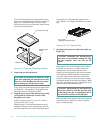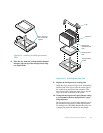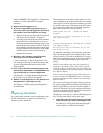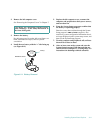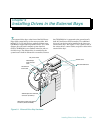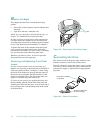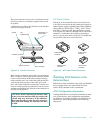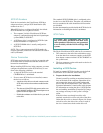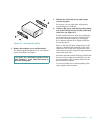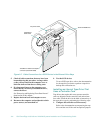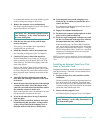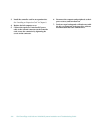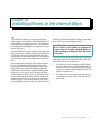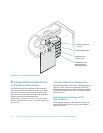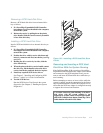
9-4 Dell PowerEdge 4100/180 and 4100/200 Systems Installation and Troubleshooting Guide
SCSI ID Numbers
Each device attached to the Ultra/Narrow SCSI host
adapter must have a unique SCSI identification (ID)
number from 0 to 7.
When SCSI devices are shipped from Dell, the default
SCSI ID numbers are assigned as follows:
•
The computer’s built-in Ultra/Narrow SCSI host
adapter is configured through the basic input/output
system (BIOS) as SCSI ID 7.
•
A SCSI tape drive is configured as SCSI ID 6 (the
default ID number for a tape drive).
•
A SCSI CD-ROM drive is usually configured as
SCSI ID 5.
NOTE: There is no requirement that SCSI ID numbers be
assigned sequentially or that devices be attached to the cable in
order by ID number.
Device Termination
SCSI logic requires that the two devices at opposite ends
of the SCSI chain be terminated and that all devices in
between be unterminated.
Before installing SCSI devices in the computer, you must
configure the terminators on the SCSI device(s) to con-
form to the following guidelines:
•
A single SCSI device (such as the standard
CD-ROM drive) is terminated.
•
If two or more SCSI devices are installed, connect
the devices as follows:
— Attach one of the devices to the end connector on the
SCSI cable, and leave the terminator enabled on that
device.
— The other end of the SCSI cable connects to the com-
puter’s built-in Ultra/Narrow SCSI host adapter or to an
optional SCSI host adapter card.
— Disable the terminators on all other devices you attach
to the cable.
The standard SCSI CD-ROM drive is configured as the
last device on the SCSI cable. Therefore, any additional
devices attached to the cable should have their termina-
tors disabled.
See the documentation provided with the SCSI device for
information on disabling the device’s terminator.
SCSI Cable
The 50-pin Ultra/Narrow SCSI cable has five connectors:
•
The connector at the end of the cable farthest away
from the other four connectors attaches to the SCSI
host adapter connector labeled “SCSI CD-ROM” on
the system board.
•
The four connectors on the cable attach to devices in
the external drive bays.
Installing a SCSI Device
To install an external SCSI device that uses the built-in
Ultra/Narrow SCSI controller, follow these steps:
1. Prepare the drive for installation.
Ground yourself by touching an unpainted metal sur-
face on the back of the computer, unpack the drive,
and compare the jumper and switch settings with
those in the drive documentation. (See “SCSI Con-
figuration Information” found earlier in this chapter
for information on setting the drive’s SCSI ID num-
ber and enabling termination [if required].) Change
any settings necessary for this system’s configu-
ration.
If the drive does not already have drive rails
attached, attach a drive rail to each side of the drive.
Orient the drive rails as shown in Figure 9-6. Secure
each drive rail to the drive with a screw in each of
the lower slotted screw holes on the drive rail.
CAUTION: Dell recommends that you use
only SCSI cables purchased from Dell. SCSI
cables purchased elsewhere are not guaranteed
to work reliably with the Dell PowerEdge 4100
systems.



